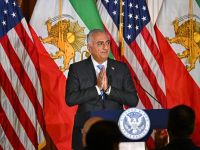Oil prices pushed back above 32 dollars a barrel on Wednesday in a volatile market which is still unsure whether oil supplies will match demand this winter, while fuel price protests raged on across Europe.
The price of a barrel of North Sea Brent bounced back to 32.15 dollars having fallen as low as 31.65 earlier in the day.
Prices have been volatile since the Organisation of Petroleum Exporting Countries (OPEC) promised at the weekend to boost output by 800,000 barrels a day from October -- a gesture deemed by most to be insufficient to cool an overheating market.
"Since OPEC met, the market has been fluctuating quite violently," said Prudential Bache broker Tony Machacek. "The market remains concerned by low stocks, but the day-to-day gyrations are difficult to follow."
Prices were sapped earlier by a further hint from Saudi Arabia that it was ready to honour some US contracts in full. Moreover, Kuwaiti Oil Minister Sheikh Saud Nasser al-Sabah reiterated in France his call for 25 dollars a barrel, French officials said.
But prices have surged to 10-year high points in recent weeks due to concerns over low stock levels. And on Wednesday, the US energy department said crude stocks fell by another one million barrels in the week which ended last Friday.
The high oil prices has rattled industrialised countries facing the twin threats of macroeconomic instability and social unrest.From the Netherlands to Poland and from Belgium to Britain, the knock-on effect from the high cost of fuel was a string of protests and blockades that threatened to wreak havoc.
Britain has borne the brunt this week because picketing truckers and farmers have prevented petrol from getting through to empty service stations, while worried shoppers stocked up on basic foodstuffs for fear the crisis would hold up deliveries.
German hauliers look set to join the protest next: the trucker association called for a national protest later this month against high oil prices.It was a different story in OPEC countries, many of which are revelling in a veritable petrodollar windfall, the grim days of 1999 and the 10-dollar barrel a distant memory.
Iran said Wednesday that surging prices would give it 10 billion dollars in extra oil revenue by early next year. A senior Nigerian official told AFP the high oil prices had been a "godsend".
Western governments have blamed OPEC for the soaring prices, and urged it to supply more oil to cool down the overheating market.
But OPEC blames the high prices on fuel taxes, and has in any case kept in place a mechanism whereby it could add another 500,000 barrels per day to output if prices remain sky high.
And prices appear set to do just that, analysts say, because the market is still unsure whether the OPEC output pledge will make any difference to prices once it kicks in on October 1. "Our thought after the OPEC meeting is that the extra 800,000 barrels would push prices back to 30 dollars, but we would be surprised to see it below 30," said ABN Amro market analyst Peter Nicol. "For that to happen we would need some more changes" in supply.
Indeed, in the medium term, with winter looming and demand likely to spike, analysts have not ruled out the return of the 40-dollar barrel -- a phenomenon not seen since the 1990 Gulf war.
"We could still go to 40 dollars," said Machacek. "The overall trend over previous months has been consistently high."
Oil prices at such levels would present a new headache to oil-dependent countries and companies, filtering through into rising inflation at national level, and hitting corporate bottom lines, economists believe.—AFP.
©--Agence France Presse







